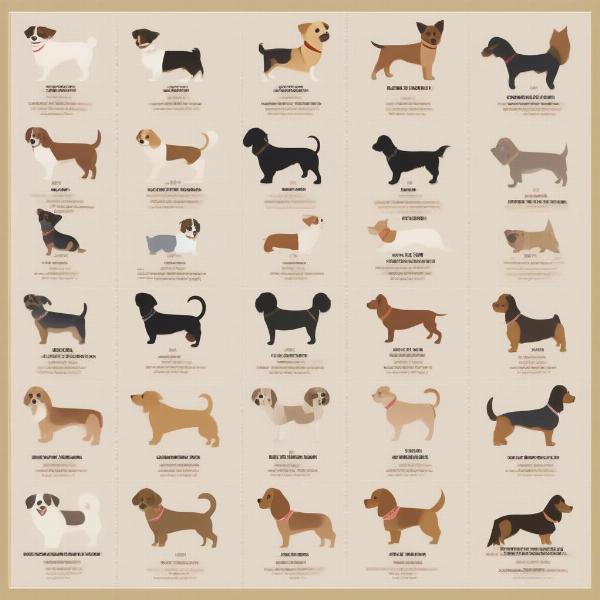Small dogs have captured the hearts of many with their endearing personalities and convenient size. “Dogs that stay little forever” are perfect for apartment living, easy to travel with, and often require less strenuous exercise than larger breeds. But with so many adorable small dog breeds to choose from, finding the right one can feel overwhelming. This guide will explore everything you need to know about small dog breeds, from personality traits and health considerations to grooming needs and training tips.
Choosing the Right Small Dog Breed
Selecting a dog breed that aligns with your lifestyle is crucial for a harmonious relationship. While all small dogs share the common trait of petite stature, their personalities, energy levels, and grooming requirements can differ significantly.
Personality and Temperament
Some small breeds, like Chihuahuas, are known for their feisty and devoted nature, often bonding strongly with one person. Others, like Cavalier King Charles Spaniels, are renowned for their gentle and adaptable personalities, making them excellent family pets. Considering your living situation and activity level is key. If you live in a bustling household with children, a robust and playful breed like a Jack Russell Terrier might be a good fit. However, if you prefer a calmer companion for a quiet apartment, a Shih Tzu might be a more suitable choice.
 Small Dog Personality Comparison Chart
Small Dog Personality Comparison Chart
Grooming Needs
Long-haired breeds like Yorkshire Terriers and Maltese require regular brushing to prevent matting and tangles. Short-haired breeds like Chihuahuas and French Bulldogs have less demanding grooming needs, but regular nail trims and occasional baths are still necessary. Researching grooming requirements beforehand will help you choose a breed that fits your schedule and commitment.
Health and Care for Small Dogs
Small dogs can be prone to specific health issues, including dental problems, luxating patellas, and tracheal collapse. Regular veterinary checkups and a healthy diet are essential for maintaining their well-being.
Dietary Needs
Small breeds have faster metabolisms and require nutrient-dense food formulated for their size. Feeding them high-quality kibble or wet food, specifically designed for small breeds, is crucial for their overall health. Avoid overfeeding, as it can lead to obesity and other health complications.
Exercise Requirements
While small dogs don’t require as much space as larger breeds, they still need regular exercise to stay healthy and happy. Daily walks, playtime in the park, or interactive games can provide the physical and mental stimulation they need.
Training Your Small Dog
Training a small dog can be challenging, as they can be prone to “small dog syndrome,” a behavioral issue where they display dominance or aggression due to a lack of consistent training. Positive reinforcement methods, such as using treats and praise, are highly effective.
Are Small Dogs Right for You?
“Dogs that stay little forever” offer many advantages, but it’s essential to consider the commitment involved. Their small size makes them easier to handle and care for, but they also require specific attention to their health and training needs. If you’re prepared to provide the necessary care and attention, a small dog can be a loving and rewarding companion for many years to come.
FAQ
- What are some popular “dogs that stay little forever”? Popular small breeds include Chihuahuas, Yorkshire Terriers, Pomeranians, Dachshunds, and French Bulldogs.
- Do small dogs require less exercise? While they don’t need as much space, they still require regular exercise and mental stimulation.
- Are small dogs good with children? Some small breeds are better suited for families with older children, while others are more adaptable to younger children.
- What are common health issues in small dogs? Dental problems, luxating patellas, and tracheal collapse are some common health concerns in small breeds.
- How often should I groom my small dog? Grooming needs vary depending on the breed’s coat type. Long-haired breeds require more frequent brushing than short-haired breeds.
- What is the best food for small dogs? High-quality kibble or wet food formulated specifically for small breeds is recommended.
- How can I prevent “small dog syndrome”? Consistent training and positive reinforcement methods are essential for preventing behavioral issues.
Related Articles
saver dog
dog adoption events in ct
About ILM Dog
ILM Dog is your international resource for expert dog care advice. We offer valuable insights into various aspects of dog ownership, from breed selection and health management to training techniques, nutrition guidance, and product recommendations. Whether you’re looking for tips on grooming your Yorkshire Terrier or understanding the nutritional needs of a Chihuahua, our expert articles provide practical, trustworthy information. dog walking volunteer With a global focus, we cater to dog owners from all cultural backgrounds, making sure our content is accessible and relevant to diverse audiences. Contact us at [email protected] or call us at +44 20-3965-8624 for personalized guidance. For a wealth of information on all things dog, visit ILM Dog today.